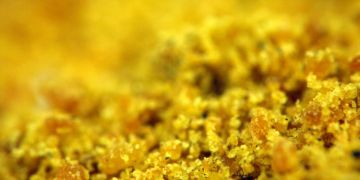The Origin of Mace
When looking for mace supplements, you may see that nutmeg appears quite often. Because mace and nutmeg are derived from the same plant, Myristica fragrans, they are often used interchangeably. Nutmeg is the dried, shelled seed of Myristica fragrans, whereas mace is derived from the dried covering of the seed's shell. Because nutmeg has a history of being abused as a psychoactive drug, it isn't used as widely as mace in medicinal preparations.
Mace Active Ingredients
Mace's main constituent is 7-9% of a volatile oil, along with resins, protein, gum, fixed oils and sugar. The volatile oil contains myristicin, geraniol and pinene. These compounds are responsible for mace's medicinal effects.
Dosage Limits
Because of the high concentrations of these volatile oil compounds, it is recommended to never take more than 1 teaspoon of mace at any given time.
Health Benefits
A few of the most well known health benefits of Mace are listed below.
Digestive Health
Mace has long been used to treat digestive woes such as nausea, diarrhea, stomach spasms and gas. A common mixture known to ease indigestion, gas and nausea is a tea made of slippery elm bark, mace and nutmeg which are combined with cream and boiled, then drank when lukewarm. A popular treatment for diarrhea, according to Chinese and Indian medicine, is to place 3 drops of the essential oil of mace/nutmeg on a sugar cube and swallow it after the oil has seeped in. If a capsule is preferred, one 200mg capsule can be taken twice per day until the diarrhea subsides.
Treatment and Prevention of Cancer
A study published in the April 2012 issue of the "Asian Pacific Journal of Tropical Medicine" showed the essential oil of mace/nutmeg can help treat, and possibly prevent, cancer by inhibiting the formation of blood vessels that feed cancerous tumors. A study published in the April 2012 issue of the "Journal of Food Science" showed the compound myristicin to inhibit the growth of colon cancer cells.
Alleviates Anxiety and Depression
Mace also offers mild anti-anxiety and sedative properties. In a report published in the Spring 2006 issue of the "Journal of Medicinal Food", mace was shown to exert significant anti-depressant effects. Researchers made the conclusion that these affects arise from the activation of the neurotransmitters dopamine and serotonin.
Pain Relief
Mace has been used for centuries in Chinese medicine as a topical pain relieving massage oil. A few drops of the essential oil mixed with an ounce of a carrier oil, such as olive or grapeseed, then massaged onto the affected area, can provide relief from many ailments: muscle pain, arthritis, aching joints, bruises and sores.
Breath Freshener
Mace is highly effective at combating bad breath because of its antibacterial properties. By adding a very slight pinch to your toothbrush when brushing your teeth, it can destroy the bacteria that cause bad breath.





